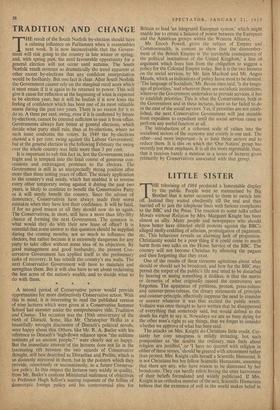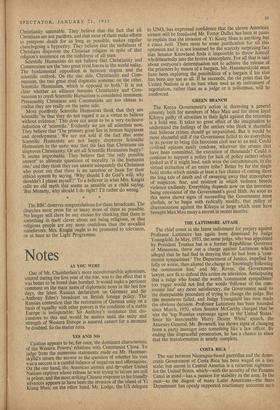LITTLE SISTER
THE televising of 1984 produced a lamentable display by the public. People were so mesmerised by Big Brother that it never occurred to them to switch him off. Instead they waited obediently till the end and then hurried off to jam the telephone lines with furious complaints to the BBC and the Press. The reaction to some talks called Morals without Religion by Mrs. Margaret Knight has been almost as silly. Many people and newspapers who should know better have directed shrill protests against the BBC's alleged molly-coddling of atheism, promulgation of paganism, etc. This behaviour reveals an alarming lack of proportion. Christianity would be a poor thing if it could come to much harm from two talks on the Home Service of the BBC. The country will not become Christian by silencing the pagans and then forgetting that they exist.
One of the results of these tiresome agitations about what should or should not be broadcast, and how far the BBC may permit the torpor of the public's life and mind to be disturbed by hearing or seeing something it dislikes, is that the merits or demerits of what originally caused the controversy are forgotten. The apparatus of petitions, protest, press-release and counter-press-release, the dreary statements of principle and counter-principle, effectively suppress the need to consider or answer whatever it was that excited the public wrath. Voltaire was once thought to have written that he disapproved of everything that somebody said, but would defend to the death his right to say it. Nowadays we are so busy dying for the other man's right to say things, that we forget to consider whether we approve of what has been said.
The attacks on Mrs. Knight do Christians little credit. Cer- tainly her cosy smugness is mildly irritating, but. such pomposities as 'the doubts the ordinary man feels about religion are justified,' or '1 have no quarrel with religion in either of these senses,' should be greeted with amusement rather than protest. Mrs. Knight calls herself a Scientific Humanist. It is not Christians but her fellow Scientific Humanists. assuming that there are any, who have reason to be distressed by her broadcasts. They can hardly relish having the utter barrenness of their beliefs formulated and widely publicised. If Mrs. Knight is an orthodox member of the sect, Scientific Humanists believe that the existence of evil in the world makes belief in Christianity untenable. They believe that the fact that all Christians are not pacifists, and that most of them make efforts to postpone death for as long as possible, makes regular church-going a hypocrisy. They believe that the sinfulness of Christians disproves the Christian religion in spite of that religion's insistence on the sinfulness of all men. Scientific Humanists do not believe that Christianity and Communism are the `two Freat rival forces in the world today. The fundamental opposition is between dogma and the scientific outlook. On the one side, Christianity and Com- munism, the two great rival dogmatic systems; on the other. Scientific Humanism, which is opposed to both.' It is not clear whether an alliance between Christianity and Com- munism to crush Scientific Humanism is considered imminent. Presumably Christians and Communists are too obtuse to realise they are really on the same side.
More positively Scientific Humanists think that they are scientific in that they do not regard it as a virtue ,to believe without evidence.' This does not seem to be a very exclusive definition of `scientific.' Evidently we are all scientists now. They believe that `The primary good lies in human happiness and development.' We are not told if the fact that some Scientific Humanists are not happy disproves Scientific Humanism in the same way that the fact that Christians sin disproves Christianity. Or are all Scientific Humanists happy? It seems improbable. They believe that `the only possible answer' to ultimate questions of morality `is the humanist one,' and they think they can answer adequately the Christians who point out that there is no sanction or basis for their ethical system by saying, 'Why should I do God's will; why shouldn't I please myself?' To a believer in what Mrs. Knight calls an old myth this seems as sensible as a child saying, `But Mummy, why should I do right? I'd rather do wrong.'
The BBC deserves congratulations for these broadcasts. The churches must press for as many more of them as possible. No longer will there be any excuse for thinking that there is something in itself clever about not being ‘religious, or that religious people are any more credulous than the so-called unbelievers. Mrs. Knight ought to be promoted to television, or at least to the Light Programme.



































 Previous page
Previous page